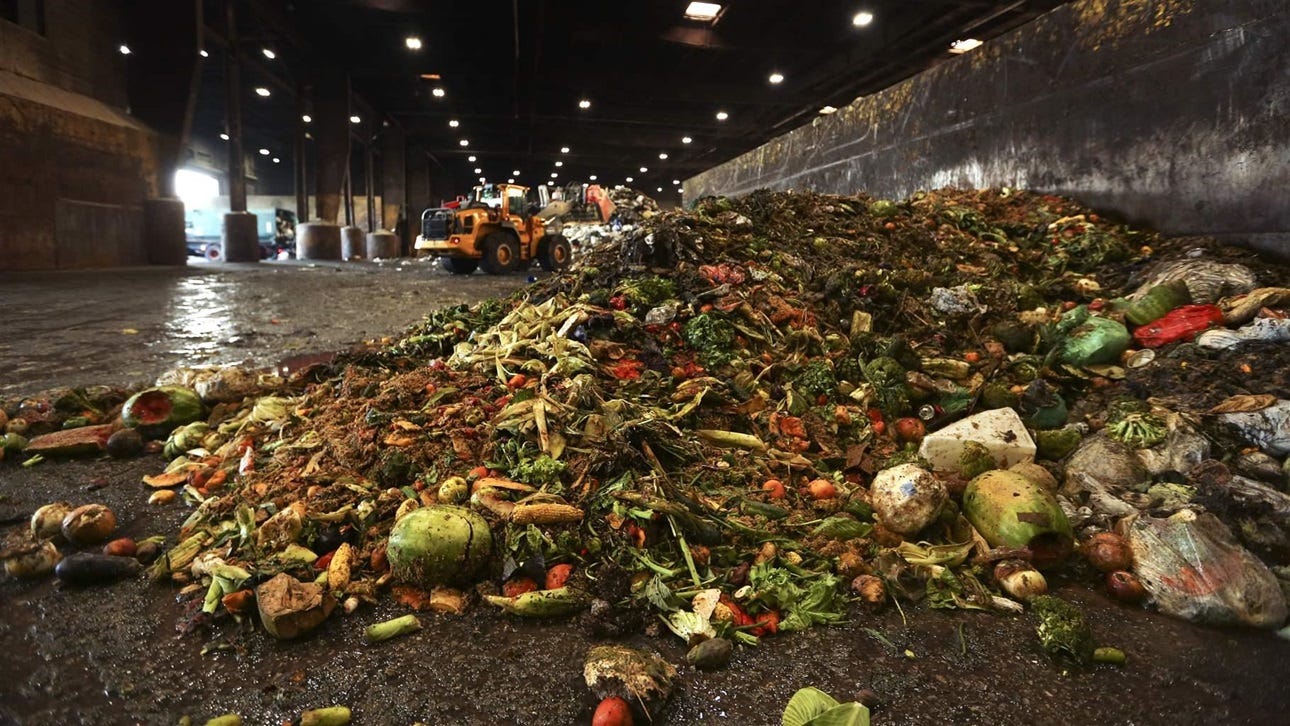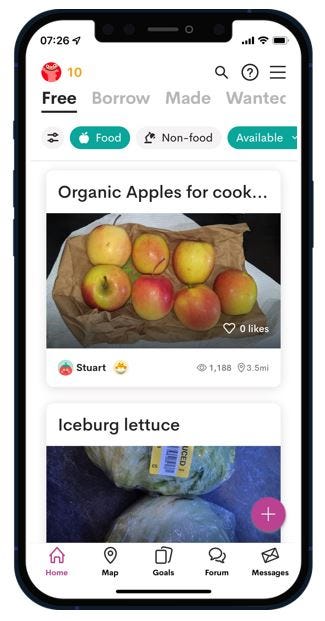Off The Shelf #3: Getting Wasted
Food waste is worse for the planet than flying. But the solution for people like you and me is incredibly simple
According to Our World in Data, food waste is responsible for about 6% of global emissions. And that’s triple the emissions that result from aviation. Yes, food waste is more harmful to the planet than flying - that shocked me too.
But how do a load of rotting sausages actually end up warming the planet?
Well before they’re even thrown away, think of the pointless energy that’s been expended during the production of those sausages. The animal feed produced, the water supplied, the fuel that powered the vehicles as they hit the road from Froghill Farm to the Angus abattoir, then from Willy Hoggard Warehousing Ltd to Waitrose.
And that’s before the black magic that kicks off when the food hits landfill. Food waste makes up around a fifth of all landfill worldwide – and the reason this is such a bad thing is that landfill is not a suitable environment for natural decomposition. Because there’s no oxygen as food waste piles up, there’s no hope of a proper composting process, and these sites just emit methane. Methane is a greenhouse gas 25 times more potent than carbon dioxide. Throwing away food and forgetting about it is therefore directly contributing to global warming.
The problems don’t just stop at the environment, either. There’s an economic impact, given that global warming leads to lower crop yields, potentially leading to food shortages and higher prices. And to make things even more twisted, think of the social injustice: the amount of food wasted each year is estimated to be enough to feed 3 billion people. That’s enough to feed the world’s starving people 3 times over. That doesn’t strike me as particularly efficient, or fair.
Despite all this, there’s some good news. But before I get to it, I want to paint a picture a bit closer to home.
The other week, I went along to a food waste awareness event run by the Hertfordshire Waste Partnership (HWP). These guys know their stuff when it comes to reducing, reusing and recycling. In 2020-21, Hertfordshire managed to recycle or compost more than half of all waste collected, and 84% of waste was able to be directed away from landfill. Two of the top 3 local authorities in England for recycling in that period were from Hertfordshire. But what’s even more impressive is that in 2020, they took one for the team and decided to go picking through everyone’s bins.
Lockdown fever pushed them to tipping point? Maybe. But I’m glad they did it, because the results of this “Waste Composition Analysis” are fascinating.
Samples were taken across 10 local authorities in order to understand what was making up all of our rubbish, and to help understand how our future policies might be best shaped.
Here’s a sobering finding: 31% of all waste across households in Hertfordshire was classified as recyclable organics. Want to guess what made up the vast majority of that? Yep. Food waste. And not only that, it was avoidable food waste (stuff that had not gone bad, and could have been eaten). The food waste found in this analysis weighed in at 52 tons. That’s about 4 London buses.
I said there was some good news, didn’t I? Well in a way, there is. The good news is that the vast majority of this food waste was avoidable. Which means… it can be avoided. And even better news: the way to avoid it is incredibly simple.
Don’t waste food.
OK, it’s easier said than done. I’d be lying if I said I wasn’t guilty of some serious transgressions in the past myself. But it’s never too late to reform, and being armed with these kinds of facts is likely to make you think twice the next time you go to sling that extra celery in the food bin after a week.
Actually, while we’re on that, of all things, why are supermarkets only offering celery in big plastic packs of two anyway? I only ever need a single stick for the spag bol I like to cook now and then, and that feeds four. But I digress. Industrial and commercial food waste is a topic for another week…
I feel like this week we’ve landed on an area where, as households, we can actually make a pretty big difference immediately. It just needs a bit of thought and planning. I’m going to continue ripping off the lovely folks from the Hertfordshire Waste Partnership again, who conducted a food waste survey earlier this year in addition to the composition analysis.
These are the top 5 reasons people throw away food:
⏰ Reached its use-by date
🍂 Finding stuff that’s been forgotten about and gone off
😴 Didn’t eat leftovers
📦 Incorrect storage leading to food going off
🛒 Buying too much food
I bet I got a few knowing nods as you all read that. It’s all just so familiar.
There are countless ways to counter the urge to waste food. Use your own judgement about whether something smells and feels ok, for a start – use-by dates aren’t the gospel truth. And try this at least twice a week: go through the fridge, chuck all the loose bits of veg into a roasting tray, cover them with olive oil, salt and pepper, and roast away. I think we’re all capable of finding tricks like this for ourselves, depending on our own vices. For me, just being aware of the five reasons above gives me a helpful framework to stop and think the next time I’m about to overload the shopping basket.
I think we’ve got a real opportunity to make a difference in this area. And I feel like this might just be one of the easiest ways to make an immediate, tangible difference to our food system.
Let’s hear from you: which tips and tricks have you found useful to keep food waste at bay?
MORSELS
🍩 The UK government did a U-turn this week, delaying a move to restrict junk food advertising and multibuy offers on fatty, sugary, salty food
💰 The Governor of the Bank of England warned this week of an ‘apocalyptic’ rise in global food prices
🍄 A German company raised $3 million this week to further its mission to make meat… from mushrooms (sort of)
ENTERPRISE SPOTLIGHT – OLIO
Sometimes, an idea is so simple that you’re kicking yourself that you didn’t have it. Olio is an app with a mission to end food waste, and it does it by connecting neighbours who have food to give away, to neighbours who can take it. You sign up to the app, list your location and what you’ve got to give away, and you’re up and running. You can see how many fellow OLIO-ers there are in your area (613 within mine, dotted around a pretty map on the app), and you can get in touch with them easily. People list the food they’re giving away, and those in need can get in touch and come and collect.
We’ve successfully used Olio at home here in Rickmansworth, Hertfordshire, easily managing to empty the cupboard before we went on holiday. It took hardly any time to find a match, and this is a town which, for all its charm, hasn’t even got Deliveroo yet. The fact that the app works so well all the way out here in the sticks surely shows how much desire there is for a community-based solution to reducing food waste.
I love the simplicity. And Olio’s ambition is striking: they’re aiming for a billion users worldwide by 2030. Yep, one eighth of the planet’s population. Sounds like a lot, but think of it as a third of the planet’s facebook users. If Mark Zuckerberg can get 40% of the earth’s population scrolling through videos of other people’s cats doing ballet, I reckon Tessa Clarke and Saasha Celestial-One can encourage a few more people to start giving away their unwanted food to neighbours, all in the name of planetary survival.
HOW CAN WE STAY IN TOUCH?
📸 I’m on Instagram where I chronicle my cooking @slothychef
👤 Same deal for Facebook Slothy Chef
📧 Drop me a note at info@slothychef.co.uk
GROWING OUR COMMUNITY
I’ve got big ideas about building a community around this subject. I hope you can get involved. It would mean so much to me if you could share across your networks using the button below. ❤️ It also helps massively if you could give me a sign that you like this!
UNTIL NEXT SATURDAY…. SLOTHY OUT
🦥 👋🏻🎤





Liam I'm loving your blogs/newsletters! Food waste is a real pet hate of mine. For years now, I've sat down and done a menu once a week, then created the necessary shopping list et voila! The kids have loved knowing what they're having over the week (and contributing to the menu ideas!) and I've loved only thinking about it once... I couldn't stand the stress of deciding what to have on a daily basis! In fact, Jamie does this with his house-mates at Uni, too. We're only buying the stuff we need, freezing or lunching on the leftovers. Minimal food waste - and minimal money waste too. As for Olio, thanks for the reminder. I joined it years ago but everyone was so far away... I'm signing up again as soon as I've finished here. Lastly... it's also a good idea to have a poke about in the freezer and cupboards every now again and come up with some dishes that use up the stuff that's been around for a while. OK, that's me done, love you! xx
That was a really interesting read, I have been so strict with reducing food waste the last few years. I try to use leftovers the next day so I don't forget about them and I freeze food if I don't get to use it. The Olio app is excellent, I encourage everyone in my area to start using it.